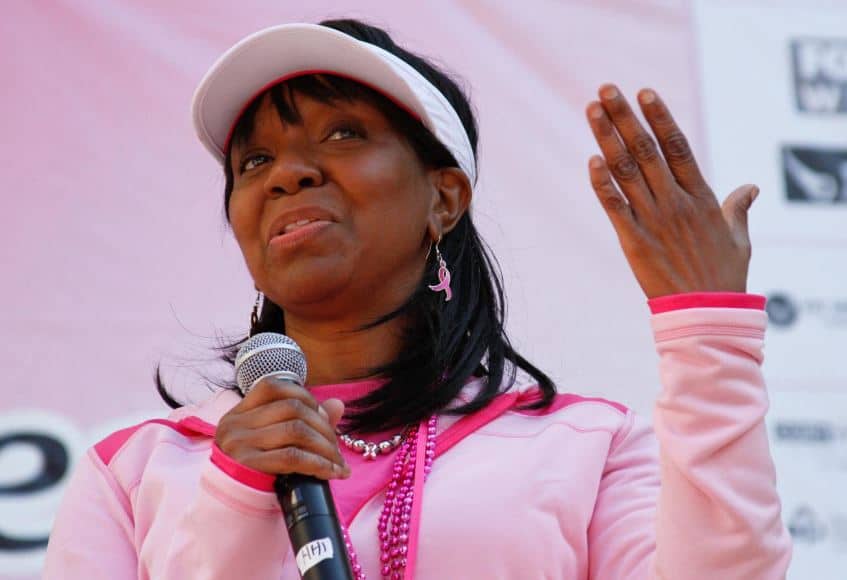
Thelma Brown is a Susan G. Komen research advocate and a two-time breast cancer survivor. She has worked in the nuclear engineering industry and is a self-proclaimed science nerd. When Thelma’s oldest sister was diagnosed with estrogen receptor (ER)- positive HER2-positive breast cancer, Thelma began to read everything she could find on the disease. “It was so complex. The more I read, the more I wanted to know,” Thelma said. “That’s how I got started in research advocacy, because I wanted to know.” Thelma also does outreach and education with people affected by breast cancer.
Breast cancer has devastated my family. My first memory of breast cancer was an aunt who died of breast cancer when I was 7 or 8. My mom had breast cancer, several of my sisters, two of whom we lost because of breast cancer and one that we lost to myelodysplastic syndrome, secondary to chemotherapy treatment. I felt that I was just waiting for the shoe to drop. I considered a prophylactic mastectomy, but life got in the way. My mom got sick, then my older sister. In fact, I lost my mom and my oldest sister, and I was diagnosed with breast cancer in the span of about a year.
I started volunteering with Komen because I felt like we needed to do something. I was fortunate because I had resources. I had a primary care doctor who listened to me, I had great insurance and I knew what I needed to do – but a lot of people don’t have the resources and don’t know what to do. I felt like I was called to stand in the gap because I truly believe that to whom much is given, much is required.
As research advocates, we provide the patient’s perspective at every juncture of a clinical trial. Even in concept development, if you are partnering with a researcher, they will sit down with you and explain the focus of their study and what their goals are. You have the opportunity to ask questions and try to really find out if this is relevant to the patient population. We actually help with the abstracts, the lay abstracts, because very often what they consider as patient friendly and easily understood, is not.
Also, we look at protocols and have the opportunity to say, “This may cause undue burden on the patient. Why are we getting three MRIs? Will the patient incur additional out of pocket costs? Will this make a big difference in your findings?” And all along the research process, we provide input. For example, with informed consents, we ask, “Can this patient really understand what you’re saying to them? Are you clearly outlining what you’re doing, why you are doing it, the adverse events, the pros and cons?” We get an opportunity to weigh in on those informed consents to make sure the patients fully understand what is being asked of them.
While I work mostly with researchers and scientists as a research advocate, I also do outreach and educational work with the community because it’s important to have your pulse on the community. If I’m not in tune with what the community, including metastatic community needs or wants, how can I be their voice?
Stand for H.E.R.- a Health Equity Revolution, is Komen’s national commitment to collaborating with Black people, policymakers, researchers and other key stakeholders to help create a world without inequities and where Black people have the same chances of surviving breast cancer as anyone. Black women are often left behind. When you look at the statistics, Black women are about 40% more likely to die from breast cancer than white women, be diagnosed at a younger age and at a later stage, so we need to double our efforts on trying to eliminate those disparate outcomes.
Breast cancer education is important. Awareness is not equivalent to education. It is urgent that we make sure that Black women understand the importance of knowing your family history, of getting screened, of knowing their normal, of making healthy lifestyle choices. We also need to educate Black women on what clinical trials are and their importance. With the abysmally low participation of Black women in trials, Black women are missing out on high-quality and potentially beneficial, cutting-edge therapies. There will be little to no data on the response to therapies and adverse events in Black women. Additionally, it is urgent that all stakeholders are involved with addressing barriers that prevent Black women from participating in clinical trials.
Until very recently, Black families didn’t talk about cancer. And still, in some settings, it’s talked about in hushed tones. We must drive home the point that if we talk about diabetes, we need to talk about breast cancer. Some conversations are more effective when it comes from someone that looks like you. It is an issue of trust.
As a research advocate, while engaging researchers and having one-on-one dialogue with clinicians, I can inform them about the needs and cultural aspects of my community. Having someone sharing our views and lived experiences is valuable to clinicians and researchers. It is often said representation matters. It is not just a cliché – it is a proven fact!
Statements and opinions expressed are that of the individual and do not express the views or opinions of Susan G. Komen. This information is being provided for educational purposes only and is not to be construed as medical advice. Persons with breast cancer should consult their healthcare provider with specific questions or concerns about their treatment.
Susan G. Komen would like to thank AstraZeneca for their generous support of Stand for H.E.R.




